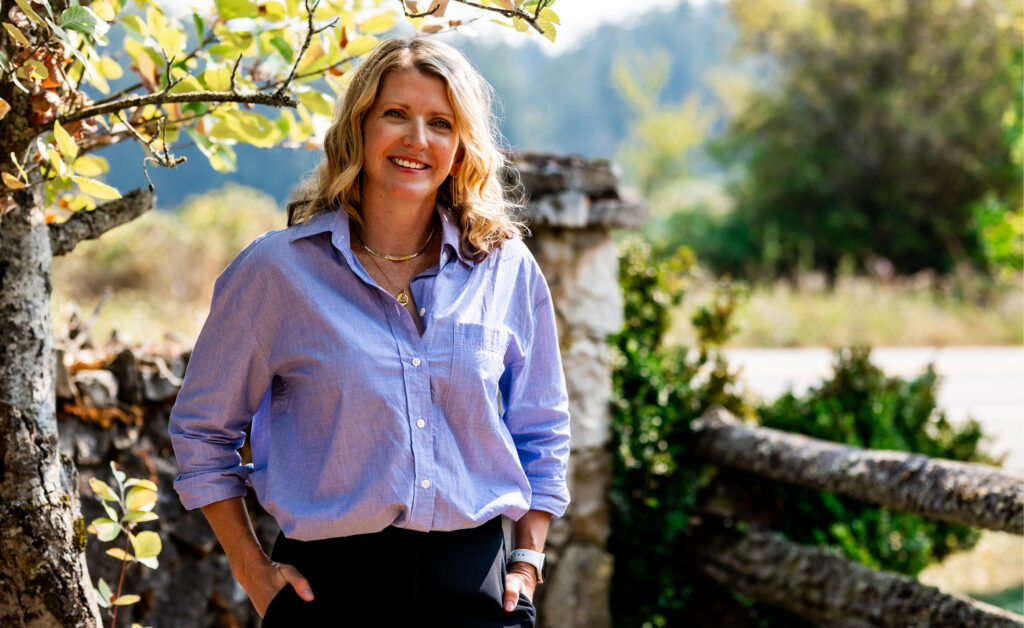Words Jesse Holth
Photo Sarah Hartley Photography
Sarah Crawford-Bohl is a healthcare leader at Island Health who gained widespread recognition for her TED talk, “Lean In, Speak Up: Igniting Change Through Courageous Conversations.”
We chatted about women in leadership, the importance of difficult conversations, and how to find your voice.
Can you tell me a bit about your background? Why did you decide to go into healthcare?
They say healthcare is a genetic vocation. My mum was a nurse. She was the best human I have ever known. She inspired me with her integrity and commitment to advocating for others. I watched her and the impact she had on people’s lives and thought: “I want to do that!”. I used to think nursing would be a starting point into healthcare … maybe I would be a physician! But then I found my drive for healthcare leadership and that is what captured my passion.
There are over 2,000 staff members in the program you are responsible for – what is it like to be in a leadership role in a complex system?
I would say leading in a complex system is both humbling and energizing. I think healthcare leadership is really about creating space for leaders (both formal and informal) to bring forward their best selves. The complexity, full of wicked issues and challenges with no easy solutions, can present quite the puzzle at times (thank goodness I love puzzles), but it also creates incredible opportunities for collaboration and innovation. I see my role less in the traditional sense of directing services and more as the person who asks curious questions, clears obstacles, and helps hold the team steady when things get turbulent.
You mentioned being inspired by some famous TED speakers on leadership and communication – can you elaborate?
I’ve always admired speakers who bring courage and honesty to the stage: people like Brené Brown, who speaks openly about shame and vulnerability, or Simon Sinek, who makes us think about purpose in a more creative and yet accessible way. They don’t hide behind jargon or perfection. Instead, they meet people where they are and invite them to be curious, to ask bigger questions, and think outside boxes dictated by history or the status quo. That has shaped how I try to show up – not as someone with all the wisdom, but as someone willing to share a story and spark reflection.
Being a woman in a leadership role is not always easy – what have you learned through this process?
One of the biggest lessons for me has been learning how to show up with both confidence and humility. This can be a complex balance. As a leader, both attributes are important and, as a woman, demonstrating them can be tricky. There is a difference between how confidence and humility are viewed in men and women. The difference being, what is often seen as strength and approachability for male leaders can be viewed as arrogance or weakness in women. The art seems to be standing firmly enough in my own voice that I can advocate for myself and others, holding true to my values, and still leaving space for others to shine. I continue to learn my way, finding the rhythm between confidence and humility, and trusting that strength and humility can (and should) coexist.
Your TED talk has over half a million views – it has resonated with so many people. Why do you think that is?
I think we have all met a schoolyard bully at one point in our lives, or perhaps someone who didn’t necessarily have our best interests in mind. There is a very human experience of wanting to face our fears and find our voices, even when we know there is some degree of risk in speaking up. There is a lot of research out there about how to create psychological safety but there seems to be a gap in how to speak up when psychological safety is missing. It is my hope that people are finding my talk helpful in this regard.
What does it mean to be a leader, both formal and informal?
Leadership isn’t about a title: it’s about one’s ability to influence and inspire. A formal leader may have responsibility for budgets or direct reports, but both formal and informal leaders have the power to shape culture, set tone and inspire action. Some of the most impactful leaders don’t have a formal title; they simply have the ability to connect with people, the courage to speak up, and model integrity. We need both kinds of leaders if we want healthy systems.
Why is it so hard for people to engage in difficult or uncomfortable conversations? How can we benefit from normalizing these kinds of dialogues?
We avoid difficult or uncomfortable conversations because our brains are wired to keep us safe from harm. Social threats, like the possibility of rejection or conflict, activate the same survival circuits as physical threats. That means our nervous system reacts as if we’re in danger, even though it’s “just a conversation.” So, avoidance becomes our default. The irony is that avoiding hard conversations can create more harm, erode trust and prevent the very real possibility of developing stronger relationships. When we normalize courageous dialogue, we retrain our brains. We show ourselves and others that speaking up doesn’t always lead to danger: it can lead to connection, problem-solving and innovation. This shift takes practice, but once people experience it, the fear begins to loosen its grip. In healthcare, our willingness to engage in courageous conversations helps improve morale, contributes to staff retention and supports better patient outcomes.
What advice do you have for people who are struggling with imposter syndrome?
I think it is important for people to know imposter syndrome is normal and more common than we think. Some of the most accomplished people I know still wrestle with it. The truth is we are all a work in progress: perfectly imperfect. Courage, by definition, is not acting in the absence of fear but rather acting in the face of it. With imposter syndrome, we have the opportunity to call on that courage and step forward being OK knowing we might not get it all right. Noticing our self-doubt, and naming it (for example, saying to yourself or out loud: “I am nervous and not feeling totally confident in this moment”) helps lessen the power of imposter syndrome.
In your TED talk, you mention a compass of moral values – using support, empathy and wonder to navigate difficult conversations. Can you explain?
The compass was inspired by my mum’s incredible moral compass. She had a way of always guiding me towards the good and right thing to do, even when it was uncomfortable. I built my compass as a framework, a tool to lean on when hesitant to step into a difficult conversation. The directions in this compass act as reminders of the values that can move us past the first reactive moment of self-protection and into a more proactive mindset. The compass doesn’t eliminate discomfort, but it points us towards courage, connection and clarity.
You said that people have a choice – they can stay silent, or stand up for what’s right. How can we help people understand that their voice is important?
We need to remember we are worthy. Our voice carries worth, even when it feels small or insignificant. Silence may feel safer in the moment, but it can come at a cost to ourselves, to others, and to the possibility of change.
When we choose to speak, we remind ourselves that we are worthy of being heard. Of course, sometimes listening is truly the best and wisest path. But we also need to remember that our words can generate needed ripples. Our voices rarely stand alone. Sometimes, speaking up gives permission for others to do the same. And this is how change, innovation and movements begin: one voice sparking, amplifying and strengthening the voice of another.




